Mental Health Nursing
VerifiedAdded on 2022/11/30
|7
|1839
|496
AI Summary
This article discusses the treatment of insane individuals who are sent to an asylum for mental health care. It highlights the issues of involuntary treatment and the importance of multidisciplinary teams in mental health nursing.
Contribute Materials
Your contribution can guide someone’s learning journey. Share your
documents today.
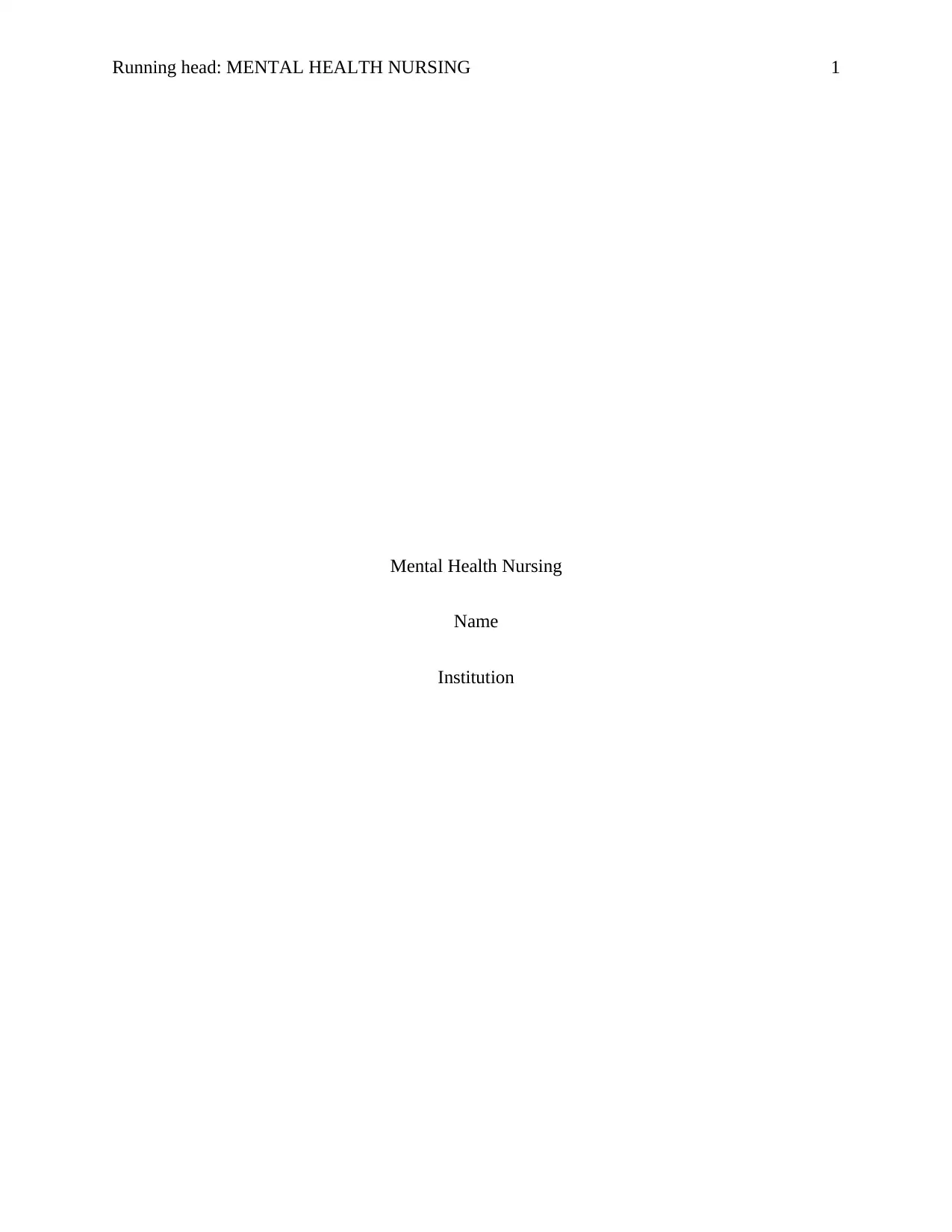
Running head: MENTAL HEALTH NURSING 1
Mental Health Nursing
Name
Institution
Mental Health Nursing
Name
Institution
Secure Best Marks with AI Grader
Need help grading? Try our AI Grader for instant feedback on your assignments.
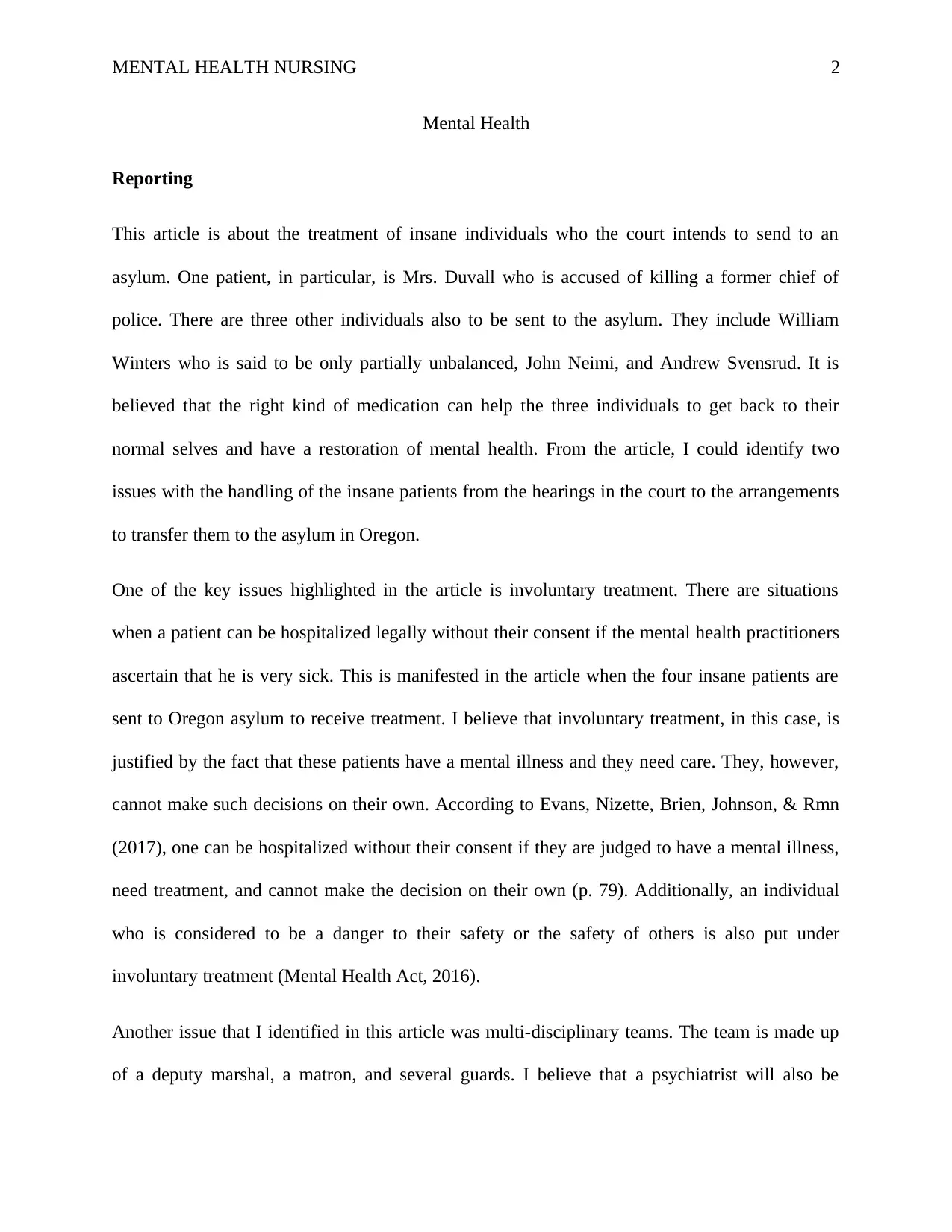
MENTAL HEALTH NURSING 2
Mental Health
Reporting
This article is about the treatment of insane individuals who the court intends to send to an
asylum. One patient, in particular, is Mrs. Duvall who is accused of killing a former chief of
police. There are three other individuals also to be sent to the asylum. They include William
Winters who is said to be only partially unbalanced, John Neimi, and Andrew Svensrud. It is
believed that the right kind of medication can help the three individuals to get back to their
normal selves and have a restoration of mental health. From the article, I could identify two
issues with the handling of the insane patients from the hearings in the court to the arrangements
to transfer them to the asylum in Oregon.
One of the key issues highlighted in the article is involuntary treatment. There are situations
when a patient can be hospitalized legally without their consent if the mental health practitioners
ascertain that he is very sick. This is manifested in the article when the four insane patients are
sent to Oregon asylum to receive treatment. I believe that involuntary treatment, in this case, is
justified by the fact that these patients have a mental illness and they need care. They, however,
cannot make such decisions on their own. According to Evans, Nizette, Brien, Johnson, & Rmn
(2017), one can be hospitalized without their consent if they are judged to have a mental illness,
need treatment, and cannot make the decision on their own (p. 79). Additionally, an individual
who is considered to be a danger to their safety or the safety of others is also put under
involuntary treatment (Mental Health Act, 2016).
Another issue that I identified in this article was multi-disciplinary teams. The team is made up
of a deputy marshal, a matron, and several guards. I believe that a psychiatrist will also be
Mental Health
Reporting
This article is about the treatment of insane individuals who the court intends to send to an
asylum. One patient, in particular, is Mrs. Duvall who is accused of killing a former chief of
police. There are three other individuals also to be sent to the asylum. They include William
Winters who is said to be only partially unbalanced, John Neimi, and Andrew Svensrud. It is
believed that the right kind of medication can help the three individuals to get back to their
normal selves and have a restoration of mental health. From the article, I could identify two
issues with the handling of the insane patients from the hearings in the court to the arrangements
to transfer them to the asylum in Oregon.
One of the key issues highlighted in the article is involuntary treatment. There are situations
when a patient can be hospitalized legally without their consent if the mental health practitioners
ascertain that he is very sick. This is manifested in the article when the four insane patients are
sent to Oregon asylum to receive treatment. I believe that involuntary treatment, in this case, is
justified by the fact that these patients have a mental illness and they need care. They, however,
cannot make such decisions on their own. According to Evans, Nizette, Brien, Johnson, & Rmn
(2017), one can be hospitalized without their consent if they are judged to have a mental illness,
need treatment, and cannot make the decision on their own (p. 79). Additionally, an individual
who is considered to be a danger to their safety or the safety of others is also put under
involuntary treatment (Mental Health Act, 2016).
Another issue that I identified in this article was multi-disciplinary teams. The team is made up
of a deputy marshal, a matron, and several guards. I believe that a psychiatrist will also be
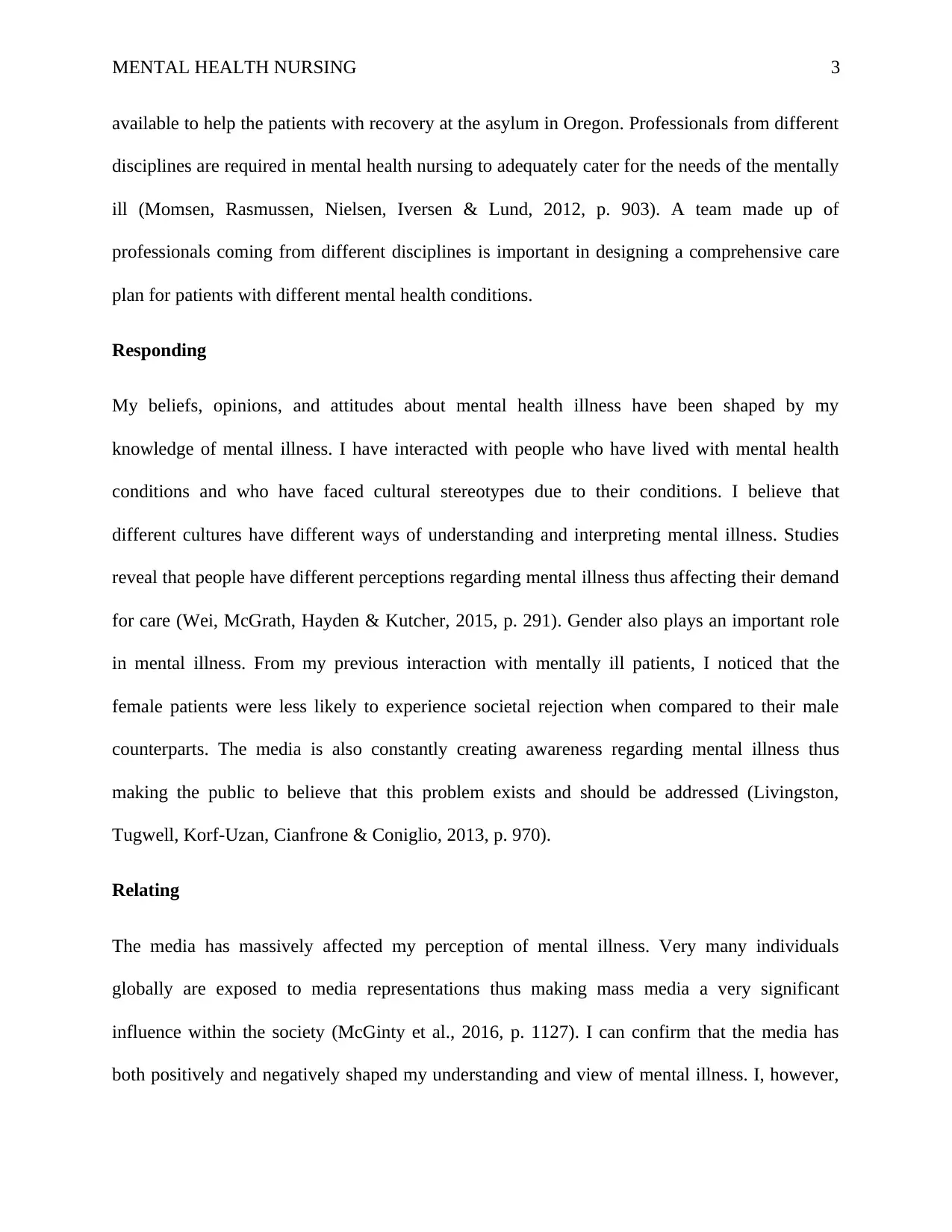
MENTAL HEALTH NURSING 3
available to help the patients with recovery at the asylum in Oregon. Professionals from different
disciplines are required in mental health nursing to adequately cater for the needs of the mentally
ill (Momsen, Rasmussen, Nielsen, Iversen & Lund, 2012, p. 903). A team made up of
professionals coming from different disciplines is important in designing a comprehensive care
plan for patients with different mental health conditions.
Responding
My beliefs, opinions, and attitudes about mental health illness have been shaped by my
knowledge of mental illness. I have interacted with people who have lived with mental health
conditions and who have faced cultural stereotypes due to their conditions. I believe that
different cultures have different ways of understanding and interpreting mental illness. Studies
reveal that people have different perceptions regarding mental illness thus affecting their demand
for care (Wei, McGrath, Hayden & Kutcher, 2015, p. 291). Gender also plays an important role
in mental illness. From my previous interaction with mentally ill patients, I noticed that the
female patients were less likely to experience societal rejection when compared to their male
counterparts. The media is also constantly creating awareness regarding mental illness thus
making the public to believe that this problem exists and should be addressed (Livingston,
Tugwell, Korf-Uzan, Cianfrone & Coniglio, 2013, p. 970).
Relating
The media has massively affected my perception of mental illness. Very many individuals
globally are exposed to media representations thus making mass media a very significant
influence within the society (McGinty et al., 2016, p. 1127). I can confirm that the media has
both positively and negatively shaped my understanding and view of mental illness. I, however,
available to help the patients with recovery at the asylum in Oregon. Professionals from different
disciplines are required in mental health nursing to adequately cater for the needs of the mentally
ill (Momsen, Rasmussen, Nielsen, Iversen & Lund, 2012, p. 903). A team made up of
professionals coming from different disciplines is important in designing a comprehensive care
plan for patients with different mental health conditions.
Responding
My beliefs, opinions, and attitudes about mental health illness have been shaped by my
knowledge of mental illness. I have interacted with people who have lived with mental health
conditions and who have faced cultural stereotypes due to their conditions. I believe that
different cultures have different ways of understanding and interpreting mental illness. Studies
reveal that people have different perceptions regarding mental illness thus affecting their demand
for care (Wei, McGrath, Hayden & Kutcher, 2015, p. 291). Gender also plays an important role
in mental illness. From my previous interaction with mentally ill patients, I noticed that the
female patients were less likely to experience societal rejection when compared to their male
counterparts. The media is also constantly creating awareness regarding mental illness thus
making the public to believe that this problem exists and should be addressed (Livingston,
Tugwell, Korf-Uzan, Cianfrone & Coniglio, 2013, p. 970).
Relating
The media has massively affected my perception of mental illness. Very many individuals
globally are exposed to media representations thus making mass media a very significant
influence within the society (McGinty et al., 2016, p. 1127). I can confirm that the media has
both positively and negatively shaped my understanding and view of mental illness. I, however,
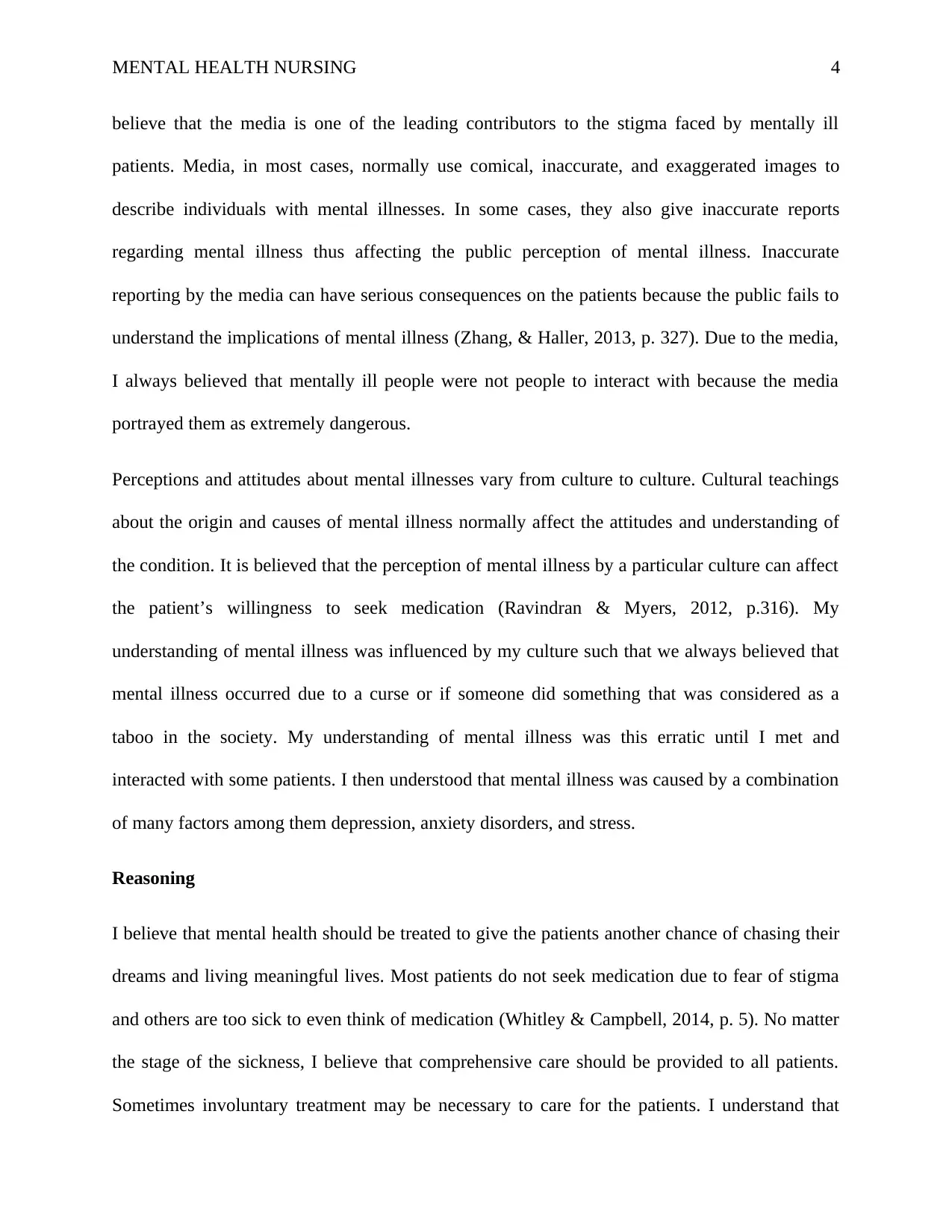
MENTAL HEALTH NURSING 4
believe that the media is one of the leading contributors to the stigma faced by mentally ill
patients. Media, in most cases, normally use comical, inaccurate, and exaggerated images to
describe individuals with mental illnesses. In some cases, they also give inaccurate reports
regarding mental illness thus affecting the public perception of mental illness. Inaccurate
reporting by the media can have serious consequences on the patients because the public fails to
understand the implications of mental illness (Zhang, & Haller, 2013, p. 327). Due to the media,
I always believed that mentally ill people were not people to interact with because the media
portrayed them as extremely dangerous.
Perceptions and attitudes about mental illnesses vary from culture to culture. Cultural teachings
about the origin and causes of mental illness normally affect the attitudes and understanding of
the condition. It is believed that the perception of mental illness by a particular culture can affect
the patient’s willingness to seek medication (Ravindran & Myers, 2012, p.316). My
understanding of mental illness was influenced by my culture such that we always believed that
mental illness occurred due to a curse or if someone did something that was considered as a
taboo in the society. My understanding of mental illness was this erratic until I met and
interacted with some patients. I then understood that mental illness was caused by a combination
of many factors among them depression, anxiety disorders, and stress.
Reasoning
I believe that mental health should be treated to give the patients another chance of chasing their
dreams and living meaningful lives. Most patients do not seek medication due to fear of stigma
and others are too sick to even think of medication (Whitley & Campbell, 2014, p. 5). No matter
the stage of the sickness, I believe that comprehensive care should be provided to all patients.
Sometimes involuntary treatment may be necessary to care for the patients. I understand that
believe that the media is one of the leading contributors to the stigma faced by mentally ill
patients. Media, in most cases, normally use comical, inaccurate, and exaggerated images to
describe individuals with mental illnesses. In some cases, they also give inaccurate reports
regarding mental illness thus affecting the public perception of mental illness. Inaccurate
reporting by the media can have serious consequences on the patients because the public fails to
understand the implications of mental illness (Zhang, & Haller, 2013, p. 327). Due to the media,
I always believed that mentally ill people were not people to interact with because the media
portrayed them as extremely dangerous.
Perceptions and attitudes about mental illnesses vary from culture to culture. Cultural teachings
about the origin and causes of mental illness normally affect the attitudes and understanding of
the condition. It is believed that the perception of mental illness by a particular culture can affect
the patient’s willingness to seek medication (Ravindran & Myers, 2012, p.316). My
understanding of mental illness was influenced by my culture such that we always believed that
mental illness occurred due to a curse or if someone did something that was considered as a
taboo in the society. My understanding of mental illness was this erratic until I met and
interacted with some patients. I then understood that mental illness was caused by a combination
of many factors among them depression, anxiety disorders, and stress.
Reasoning
I believe that mental health should be treated to give the patients another chance of chasing their
dreams and living meaningful lives. Most patients do not seek medication due to fear of stigma
and others are too sick to even think of medication (Whitley & Campbell, 2014, p. 5). No matter
the stage of the sickness, I believe that comprehensive care should be provided to all patients.
Sometimes involuntary treatment may be necessary to care for the patients. I understand that
Secure Best Marks with AI Grader
Need help grading? Try our AI Grader for instant feedback on your assignments.
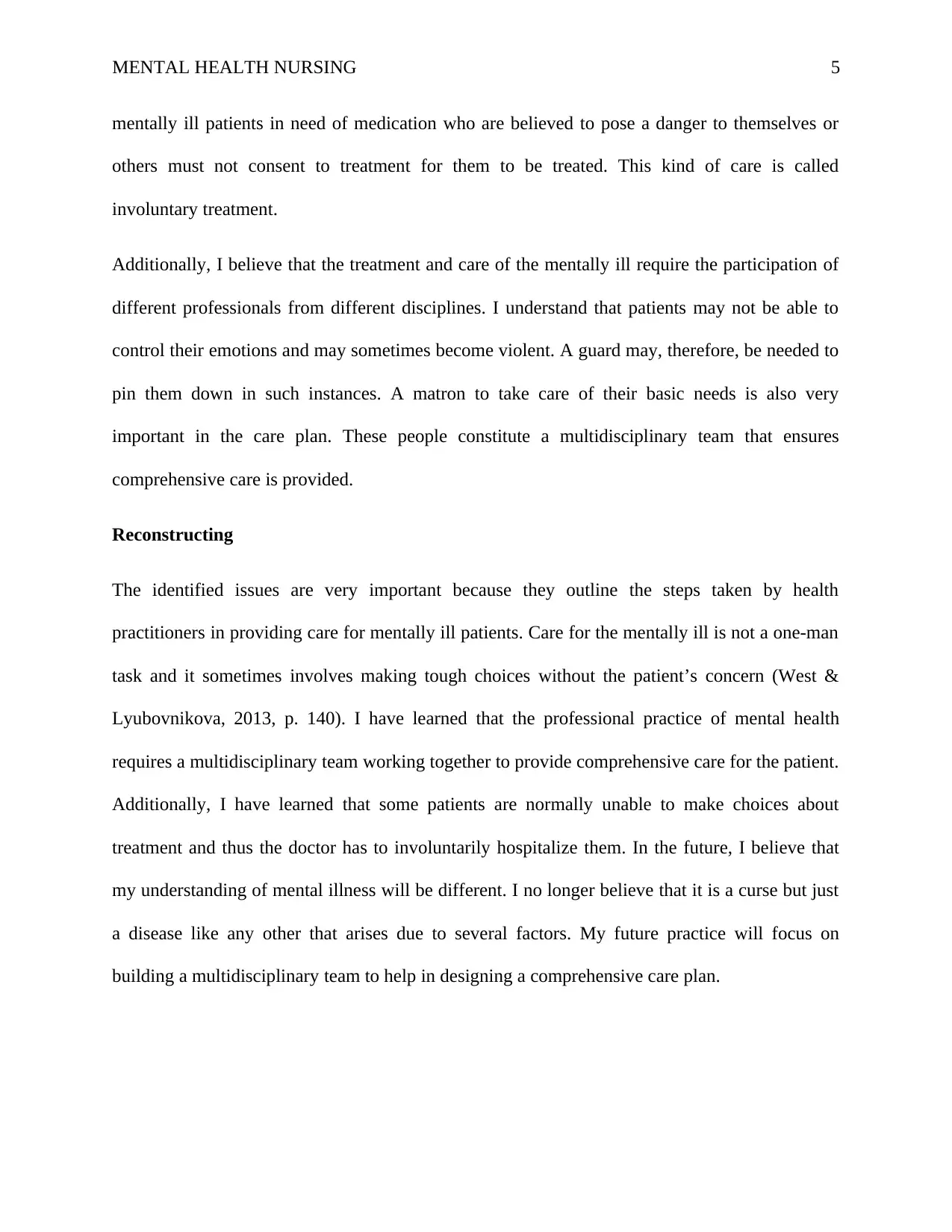
MENTAL HEALTH NURSING 5
mentally ill patients in need of medication who are believed to pose a danger to themselves or
others must not consent to treatment for them to be treated. This kind of care is called
involuntary treatment.
Additionally, I believe that the treatment and care of the mentally ill require the participation of
different professionals from different disciplines. I understand that patients may not be able to
control their emotions and may sometimes become violent. A guard may, therefore, be needed to
pin them down in such instances. A matron to take care of their basic needs is also very
important in the care plan. These people constitute a multidisciplinary team that ensures
comprehensive care is provided.
Reconstructing
The identified issues are very important because they outline the steps taken by health
practitioners in providing care for mentally ill patients. Care for the mentally ill is not a one-man
task and it sometimes involves making tough choices without the patient’s concern (West &
Lyubovnikova, 2013, p. 140). I have learned that the professional practice of mental health
requires a multidisciplinary team working together to provide comprehensive care for the patient.
Additionally, I have learned that some patients are normally unable to make choices about
treatment and thus the doctor has to involuntarily hospitalize them. In the future, I believe that
my understanding of mental illness will be different. I no longer believe that it is a curse but just
a disease like any other that arises due to several factors. My future practice will focus on
building a multidisciplinary team to help in designing a comprehensive care plan.
mentally ill patients in need of medication who are believed to pose a danger to themselves or
others must not consent to treatment for them to be treated. This kind of care is called
involuntary treatment.
Additionally, I believe that the treatment and care of the mentally ill require the participation of
different professionals from different disciplines. I understand that patients may not be able to
control their emotions and may sometimes become violent. A guard may, therefore, be needed to
pin them down in such instances. A matron to take care of their basic needs is also very
important in the care plan. These people constitute a multidisciplinary team that ensures
comprehensive care is provided.
Reconstructing
The identified issues are very important because they outline the steps taken by health
practitioners in providing care for mentally ill patients. Care for the mentally ill is not a one-man
task and it sometimes involves making tough choices without the patient’s concern (West &
Lyubovnikova, 2013, p. 140). I have learned that the professional practice of mental health
requires a multidisciplinary team working together to provide comprehensive care for the patient.
Additionally, I have learned that some patients are normally unable to make choices about
treatment and thus the doctor has to involuntarily hospitalize them. In the future, I believe that
my understanding of mental illness will be different. I no longer believe that it is a curse but just
a disease like any other that arises due to several factors. My future practice will focus on
building a multidisciplinary team to help in designing a comprehensive care plan.
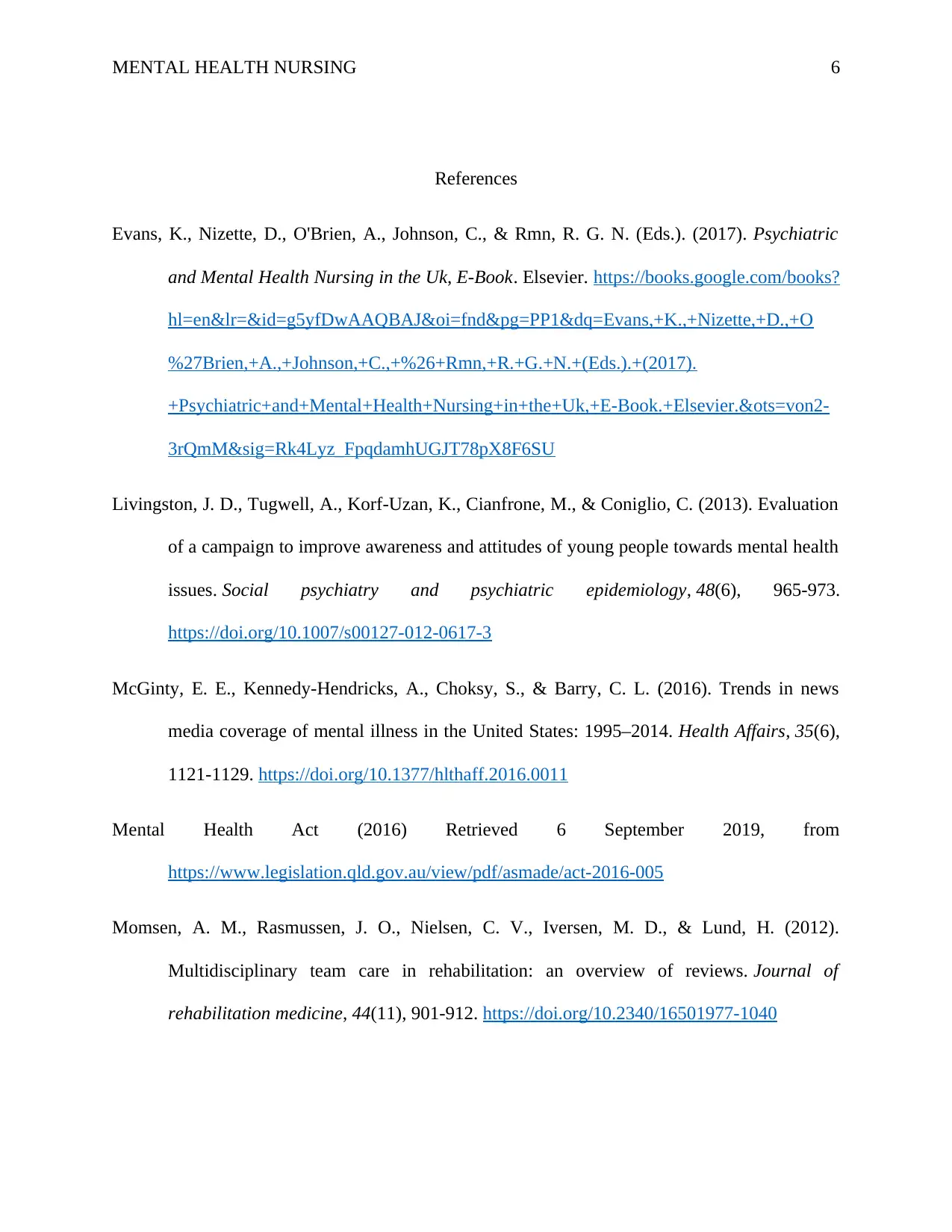
MENTAL HEALTH NURSING 6
References
Evans, K., Nizette, D., O'Brien, A., Johnson, C., & Rmn, R. G. N. (Eds.). (2017). Psychiatric
and Mental Health Nursing in the Uk, E-Book. Elsevier. https://books.google.com/books?
hl=en&lr=&id=g5yfDwAAQBAJ&oi=fnd&pg=PP1&dq=Evans,+K.,+Nizette,+D.,+O
%27Brien,+A.,+Johnson,+C.,+%26+Rmn,+R.+G.+N.+(Eds.).+(2017).
+Psychiatric+and+Mental+Health+Nursing+in+the+Uk,+E-Book.+Elsevier.&ots=von2-
3rQmM&sig=Rk4Lyz_FpqdamhUGJT78pX8F6SU
Livingston, J. D., Tugwell, A., Korf-Uzan, K., Cianfrone, M., & Coniglio, C. (2013). Evaluation
of a campaign to improve awareness and attitudes of young people towards mental health
issues. Social psychiatry and psychiatric epidemiology, 48(6), 965-973.
https://doi.org/10.1007/s00127-012-0617-3
McGinty, E. E., Kennedy-Hendricks, A., Choksy, S., & Barry, C. L. (2016). Trends in news
media coverage of mental illness in the United States: 1995–2014. Health Affairs, 35(6),
1121-1129. https://doi.org/10.1377/hlthaff.2016.0011
Mental Health Act (2016) Retrieved 6 September 2019, from
https://www.legislation.qld.gov.au/view/pdf/asmade/act-2016-005
Momsen, A. M., Rasmussen, J. O., Nielsen, C. V., Iversen, M. D., & Lund, H. (2012).
Multidisciplinary team care in rehabilitation: an overview of reviews. Journal of
rehabilitation medicine, 44(11), 901-912. https://doi.org/10.2340/16501977-1040
References
Evans, K., Nizette, D., O'Brien, A., Johnson, C., & Rmn, R. G. N. (Eds.). (2017). Psychiatric
and Mental Health Nursing in the Uk, E-Book. Elsevier. https://books.google.com/books?
hl=en&lr=&id=g5yfDwAAQBAJ&oi=fnd&pg=PP1&dq=Evans,+K.,+Nizette,+D.,+O
%27Brien,+A.,+Johnson,+C.,+%26+Rmn,+R.+G.+N.+(Eds.).+(2017).
+Psychiatric+and+Mental+Health+Nursing+in+the+Uk,+E-Book.+Elsevier.&ots=von2-
3rQmM&sig=Rk4Lyz_FpqdamhUGJT78pX8F6SU
Livingston, J. D., Tugwell, A., Korf-Uzan, K., Cianfrone, M., & Coniglio, C. (2013). Evaluation
of a campaign to improve awareness and attitudes of young people towards mental health
issues. Social psychiatry and psychiatric epidemiology, 48(6), 965-973.
https://doi.org/10.1007/s00127-012-0617-3
McGinty, E. E., Kennedy-Hendricks, A., Choksy, S., & Barry, C. L. (2016). Trends in news
media coverage of mental illness in the United States: 1995–2014. Health Affairs, 35(6),
1121-1129. https://doi.org/10.1377/hlthaff.2016.0011
Mental Health Act (2016) Retrieved 6 September 2019, from
https://www.legislation.qld.gov.au/view/pdf/asmade/act-2016-005
Momsen, A. M., Rasmussen, J. O., Nielsen, C. V., Iversen, M. D., & Lund, H. (2012).
Multidisciplinary team care in rehabilitation: an overview of reviews. Journal of
rehabilitation medicine, 44(11), 901-912. https://doi.org/10.2340/16501977-1040
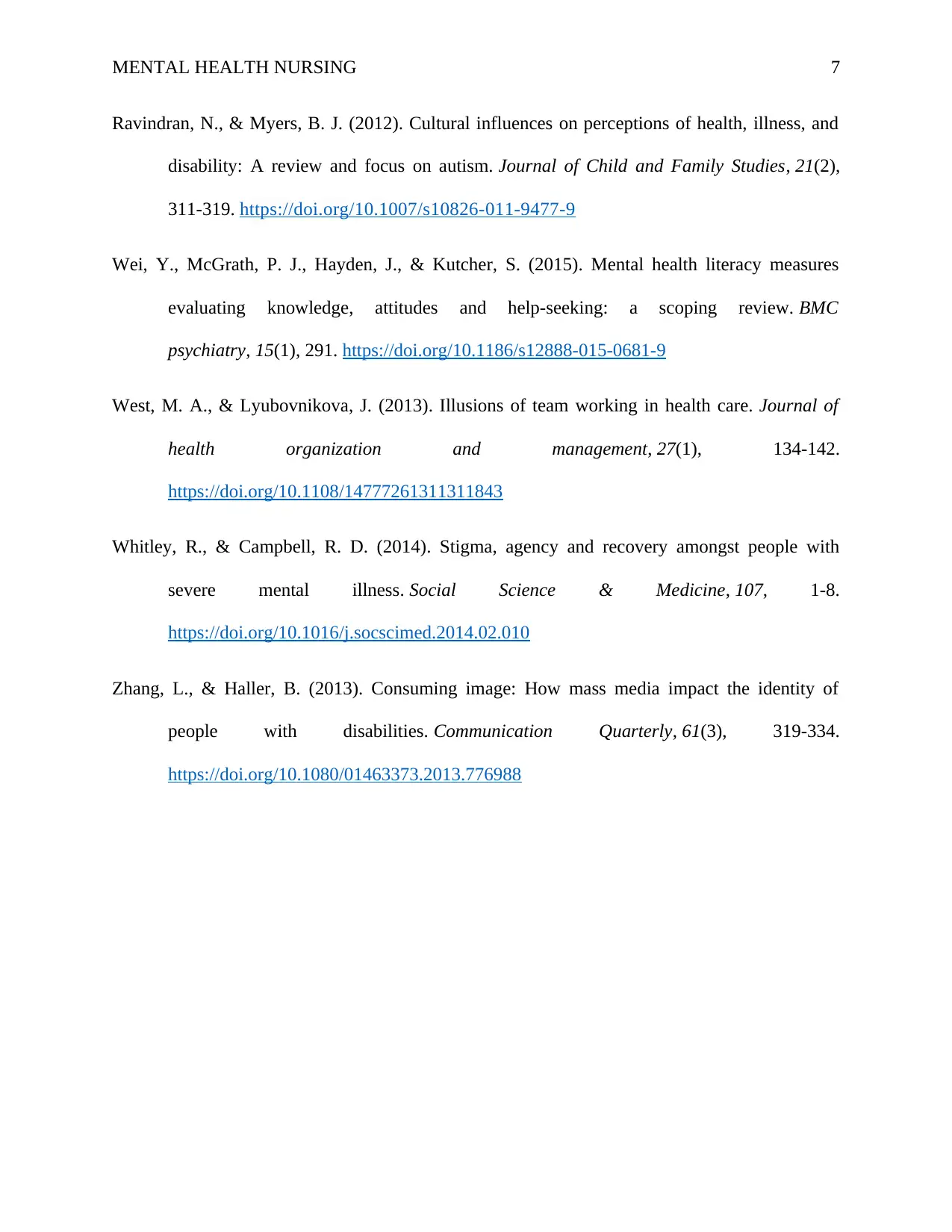
MENTAL HEALTH NURSING 7
Ravindran, N., & Myers, B. J. (2012). Cultural influences on perceptions of health, illness, and
disability: A review and focus on autism. Journal of Child and Family Studies, 21(2),
311-319. https://doi.org/10.1007/s10826-011-9477-9
Wei, Y., McGrath, P. J., Hayden, J., & Kutcher, S. (2015). Mental health literacy measures
evaluating knowledge, attitudes and help-seeking: a scoping review. BMC
psychiatry, 15(1), 291. https://doi.org/10.1186/s12888-015-0681-9
West, M. A., & Lyubovnikova, J. (2013). Illusions of team working in health care. Journal of
health organization and management, 27(1), 134-142.
https://doi.org/10.1108/14777261311311843
Whitley, R., & Campbell, R. D. (2014). Stigma, agency and recovery amongst people with
severe mental illness. Social Science & Medicine, 107, 1-8.
https://doi.org/10.1016/j.socscimed.2014.02.010
Zhang, L., & Haller, B. (2013). Consuming image: How mass media impact the identity of
people with disabilities. Communication Quarterly, 61(3), 319-334.
https://doi.org/10.1080/01463373.2013.776988
Ravindran, N., & Myers, B. J. (2012). Cultural influences on perceptions of health, illness, and
disability: A review and focus on autism. Journal of Child and Family Studies, 21(2),
311-319. https://doi.org/10.1007/s10826-011-9477-9
Wei, Y., McGrath, P. J., Hayden, J., & Kutcher, S. (2015). Mental health literacy measures
evaluating knowledge, attitudes and help-seeking: a scoping review. BMC
psychiatry, 15(1), 291. https://doi.org/10.1186/s12888-015-0681-9
West, M. A., & Lyubovnikova, J. (2013). Illusions of team working in health care. Journal of
health organization and management, 27(1), 134-142.
https://doi.org/10.1108/14777261311311843
Whitley, R., & Campbell, R. D. (2014). Stigma, agency and recovery amongst people with
severe mental illness. Social Science & Medicine, 107, 1-8.
https://doi.org/10.1016/j.socscimed.2014.02.010
Zhang, L., & Haller, B. (2013). Consuming image: How mass media impact the identity of
people with disabilities. Communication Quarterly, 61(3), 319-334.
https://doi.org/10.1080/01463373.2013.776988
1 out of 7
Your All-in-One AI-Powered Toolkit for Academic Success.
+13062052269
info@desklib.com
Available 24*7 on WhatsApp / Email
![[object Object]](/_next/static/media/star-bottom.7253800d.svg)
Unlock your academic potential
© 2024 | Zucol Services PVT LTD | All rights reserved.





